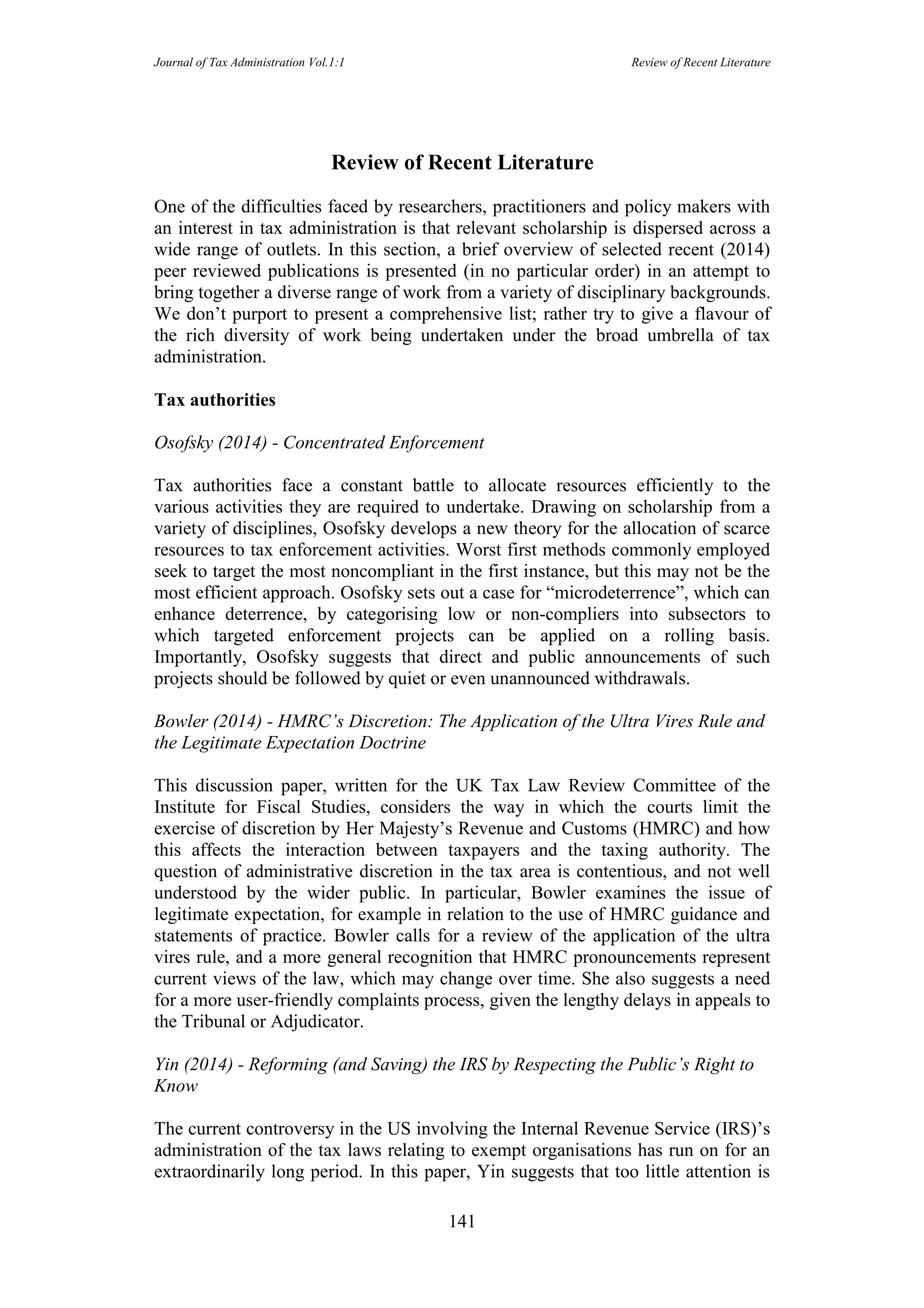Review of Recent Literature
Keywords:
Tax Authorities, Tax Adjudication, Tax Complexity, Tax Compliance, Corporate Compliance, Cross Border Compliance, The Tax Gap, Administrative Burden, Tax ProfessionalsAbstract
One of the difficulties faced by researchers, practitioners and policy makers with an interest in tax administration is that relevant scholarship is dispersed across a wide range of outlets. In this section, a brief overview of selected recent (2014) peer reviewed publications is presented (in no particular order) in an attempt to bring together a diverse range of work from a variety of disciplinary backgrounds. We don’t purport to present a comprehensive list; rather try to give a flavour of the rich diversity of work being undertaken under the broad umbrella of tax administration.
References
Afield, W. E. (2014). A Market for Tax Compliance. Cleveland State Law Review, 62(2), 315-342. Retrieved from http://engagedscholarship.csuohio.edu/clevstlrev/vol62/iss2/5
Alarie, B., & Green, A. J. (2014). Policy Preferences and Expertise in Canadian Tax Adjudication. Canadian Tax Journal/Revue Fiscale Canadienne, 62(4). Retrieved from http://www.ctf.ca/CTFWEB/EN/Publications/CTJ_Contents/2014CTJ4.aspx
Blank, J. D. (2014a). Collateral Compliance. University of Pennsylvania Law Review, 162(4), 719-800. Retrieved from http://www.pennlawreview.com/print/?vid=11
Blank, J. D. (2014b). Reconsidering Corporate Tax Privacy. New York University Journal of Law and Business, 11(1). Retrieved from http://lsr.nellco.org/nyu_lewp/395
Blouin, J. (2014) Defining and Measuring Tax Planning and Aggressiveness, National Tax Journal, 67 (4), 875-900.
Braunerhjelm, P., & Eklund, J. E. (2014). Taxes, Tax Administrative Burdens and New firm formation. Kyklos, 67(1), 1–11. doi:10.1111/kykl.12040
Bowler, T. (2014). HMRC’s Discretion: The Application of the Ultra Vires Rule and the Legitimate Expectation Doctrine. (IFS Reports R102) Institute for Fiscal Studies, doi: 10.1920/re.ifs.2014.0102
Bowler, T. (2014). The Office of Tax Simplification: Looking Back and Looking Forward. Institute for Fiscal Studies, doi: 10.1920/re.ifs.2014.0103.
Christians, A. (2014). Regulating Tax Preparers: A Global Problem for the IRS. Tax Notes International, 75, 319. Retrieved from http://papers.ssrn.com/abstract=2477195
Dowling, G. R. (2014) The curious case of corporate tax avoidance: is it socially irresponsible? Journal of Business Ethics 124, 173-184. Doi: 10.1007/s10551-013-1862-4.
Fogarty, T., & A. Jones, D. (2014). Between a rock and a hard place. Qualitative Research in Accounting & Management, 11(4), 286–316. doi:10.1108/QRAM-06-2013-0024
Gemmell, N., & Hasseldine, J. (2014). Taxpayers’ Behavioural Responses and Measures of Tax Compliance ‘Gaps’: A Critique and a New Measure, Fiscal Studies 35(30), 275-296. doi: 10.1111/j.1475-5890.2014.12031.x
Hayes, R. S., & Baker, R. (2014). A participant observation study of the resolution of audit engagement challenges in government tax compliance audits. Qualitative Research in Accounting & Management, 11(4), 416-439. doi: http://dx.doi.org/10.1108/QRAM-02-2013-0003
Hashimzade, N., Myles, G. D., Page, F. & Rablen, M. D. (2014). Social networks and occupational choice: the endogenous formation of attitudes and beliefs about tax compliance. Journal of Economic Psychology, 40 (2014), 134-146. DOI: 10.1257/jep.28.4.121
Hoffman, E., Gangl, K., Kircher, E. & Stark, J. (2014) Enhancing Tax Compliance through Coercive and Legitimate Power of Tax Authorities by Concurrently Diminishing or Facilitating Trust in Tax Authorities. Law and Policy, 36(3) 290 – 313. doi: 10.1111/lapo.12021
Kaye, A. T. (2014). Innovations in the War on Tax Evasion. Brigham Young University Law Review, 2014(2), 363-414. Retrieved from http://digitalcommons.law.byu.edu/lawreview/
Kirchler, E. Kogler, C. & Muehlbacher, S. (2014). Cooperative Tax Compliance: From Deterrence to Deference. Current Directions in Psychological Science 23(2), 87-92. doi: 10.1177/0963721413516975
Knuutinen, R. (2014). Corporate social responsibility, taxation and aggressive tax planning. Nordic Tax Journal, 2014(1), 36-75. Retrieved from https://www.djoef-forlag.dk/sites/ntj/
Krever, R. (2014). Combating VAT fraud: Lessons from Korea? British Tax Review, 2014 (3), 329-341.
Madison, A. D. (2014). The Futility of Tax Protester Arguments. Thomas Jefferson Law Review, 36(2), 253-308. Retrieved from http://www.tjeffersonlrev.org/
Manhire, J. T. (2014). There Is No Spoon: Reconsidering the Tax Compliance Puzzle. Florida Tax Review,17(1). Retrieved from http://papers.ssrn.com/abstract=2459644
Osofsky, L. (2014). Concentrated Enforcement. Florida Tax Review, 16(6), 325. http://dx.doi.org/10.2139/ssrn.2366431
Sawyer, A. (2014). Comparing the Swiss and United Kingdom cooperation agreements with their respective agreements under the Foreign Account Tax Compliance Act. eJournal of Tax Research, 12(2), 285-318. Retrieved from https://www.business.unsw.edu.au/research-site/publications-site/ejournaloftaxresearch-site/Documents/01_Sawyer_UK_Switzerland.pdf
Tran-Nam, B., & Evans, C. (2014). Towards the Development of a Tax System Complexity Index, Fiscal Studies 35(3), 341-370. doi: 10.1111/j.1475-5890.2014.12033.x
Walpole, M. and Salter, D. (2014) Regulation of Tax Agents in Australia. eJournal of Tax Research, 12(2), 335-358. Retrieved from https://www.business.unsw.edu.au/research-site/publications-site/ejournaloftaxresearch-site/Documents/03_WalpoleSalter_RegulationOfTaxAgentsAustralia.pdf
Yin, G. K. (2014). Reforming (and Saving) the IRS by Respecting the Public’s Right to Know. Virginia Law Review, 100(6), 1115-1164. Retrieved from http://www.virginialawreview.org/volumes/content/reforming-and-saving-irs-respecting-publics-right-know
Zucman, G. (2014). Taxing across Borders: Tracking Personal Wealth and Corporate Profits. The Journal of Economic Perspectives, 28(4), 121–148. DOI: 10.1257/jep.28.4.121

Published
How to Cite
Issue
Section
License
Copyright (c) 2015 Lynne Oats

This work is licensed under a Creative Commons Attribution 4.0 International License.
Our open access status means that authors retain the copyright of their work. However, all papers published in JOTA are done so under a Creative Commons Attribution 4.0 International license (CC BY). This means that others can share and/or adapt your work without your permission as long as they follow certain rules, including attributing your work correctly.
You can learn more about this on our Open Access, Licensing, and Copyright Policies page.



